Transcription of Achieving Gender Equality, Women’s Empowerment and ...
1 united NationsDialogues at the economic anD social councilThis publication presents the key debates that took place during the 2010 High-level Segment of the economic and Social Council, at which ECOSOC organized its second biennial Development Cooperation Forum. The discussions also focused on the theme of the 2010 Annual Ministerial Review, Implementing the internationally agreed goals and commitments in regard to Gender equality and the Empowerment of women . economic &Social AffairsAchieving Gender Equality, Women s Empowermentand Strengthening Development CooperationUnited NationsPrinted at the united nations , New York10-50143 December 2010 2,105 USD 32 ISBN 978-92-1-130302-5 united NationsAchieving Gender Equality, Women s Empowerment and Strengthening Development CooperationasdfAchieving Gender Equality, Women s Empowerment and Strengthening Development CooperationUnited NationsNew York, 2010 Department of economic and Social AffairsOffice for ECOSOC Support and CoordinationDialogUes at the economic aND social coUNcilDepartment of economic and Social AffairsThe Department of economic and Social Affairs of the united nations Secretariat is a vital interface between global policies in the economic , social and environmental spheres and national action.
2 The Department works in three main interlinked areas: (i) it compiles, generates and analyses a wide range of economic , social and environmental data and infor-mation on which States Members of the united nations draw to review common problems and take stock of policy options; (ii) it facilitates the negotiations of Member States in many intergovernmental bodies on joint courses of action to address ongoing or emerging global challenges; and (iii) it advises interested Governments on the ways and means of translating policy frameworks developed in united nations conferences and summits into programmes at the country level and, through technical assistance, helps build national Photo/eskinder DebebeFor further information please contact: united nations Department of economic and social affairs office for ecosoc support and coordination 1 united nations Plaza, Room Dc1-1428 New York, 10017, views expressed in this publication are those of the authors and do not necessarily reflect the views of the united nations Department of economic and social nations publicationsa le s N o.
3 IsBN 978-92-1-130302-5copyright united nations , 2010 all rights reservedThis book has been prepared by the Office for ECOSOC Support and Coordination, Department of economic and Social Affairs of the united nations . The Secretary-General s reports to the Annual Ministerial Review, Development Cooperation Forum, and the official document of the Ministe-rial Declaration of the economic and Social Council (ECOSOC) High-level Segment are attached as annexes. The book also draws upon the debates and outcomes of the Council s session as well as on a series of roundtables organized in preparation for the session. The roundtables and panels were sponsored by the International Monetary Fund (IMF), Joint united nations Programme on HIV/AIDS (UNAIDS), united nations Conference on Trade and Development (UNCTAD), united nations Development Programme (UNDP), united nations Educational, Scientific and Cultural Organization (UNESCO), united nations Population Fund (UNFPA), united nations Children s Fund (UNICEF), united nations Development Fund for Women (UNIFEM), united nations Global Alliance for Information and Communica-tion Technologies and Development (UN GAID), united nations Human Set-tlements Programme (UN-Habitat), UN Office of the High Representative for the Least Developed Countries, Landlocked Developing Countries and Small Island Developing States (UN-OHRLLS)
4 , united nations Office for Partner-Acknowledgementsiv Acknowledgementsships (UNOP), International Labour Organization (ILO), united nations In-ternational Trade Centre (ITC), united nations Office of the Special Advisor on Gender Issues and Advancement of Women (OSAGI), Office of the Spe-cial Adviser on Africa (OSAA), Global Initiative for Inclusive ICTs (G3 ICT), Permanent Mission of Uganda to the united nations , World Bank, World Health Organization (WHO), and the World Trade Organization (WTO).ContentsPageAcknowledgements .. iiiGlossary of Acronyms .. ixPreface .. xiiiIntroduction .. 1 Chapter 1. Women s Empowerment and Gender Equality .. 5 Translating words to deeds: Achieving Gender equality and development for all, Mr. Hamidon Ali .. 8 Increasing uniform delivery through collective action, Mr.
5 Ban Ki-Moon .. 12 Women s rights as human rights, Ms. Michelle Bachelet .. 16 Women Empowerment : Lynchpin of development goals, Mr. Andrew Mitchell .. 21 Reviewing ongoing progress in women Empowerment and Gender equality, Mrs. Moushira Khattab .. 25 The fourth domain for Gender equality: Decision-making and power, Ms. Frances Stewart .. 31 Chapter 2. High-level Policy Dialogue on Current Developments in the World Economy and International economic Cooperation .. 37 The world economic recovery and the way forward, Mr. Sha Zukang .. 40vi contentsPageOvercoming economic weaknesses and getting back on track to MDG attainment, Mr. Supachai Panitchpakdi .. 42 Panel discussion. Presentations .. 45Mr. Reza Moghadam, International Monetary Fund .. 45Mr.
6 Otaviano Canuto, The World Bank .. 46Mr. Clemens Boonekamp, World Trade Organization .. 47 Questions and comments .. 48 Responses from panelists .. 51 Chapter 3. Thematic Discussion: Current Global and National Trends and Challenges and Their Impact on Gender Equality and Empowerment of Women . Special Policy Dialogue: The Role of Women in Countries in Special Situations .. 53 The role of women in conflict and post-conflict situations, Ms. Carla Koppell . 55 Women as agents of change: Women s participation in post-conflict governance, decision-making and planning, Ms. Leymah Gbowee .. 59 Women in conflict and post-conflict situations, Ms. Frances Stewart .. 62 Women s role in peace, development and humanitarian efforts, Mr. Jan Egeland .. 64 The role of women in countries in special situations economic reconstruction, Ms.
7 Graciana del Castillo .. 68 Chapter 4. Annual Ministerial Review: Implementing the Internationally Agreed Goals and Commitments in Regard to Gender Equality and the Empowerment of Women .. 73 Part A. Policy messages from the Annual Ministerial Review Preparatory meetings .. 75 Africa Regional Meeting, Women and Health, Ms. Ndeye Khady Diop .. 75 Global Preparatory Meeting: Who feeds the world in 2010 and beyond? Rural women as agents of change and champions of global food security , Ms. Florence Chenoweth .. 76 Special event on engaging philanthropy to promote women s Empowerment and Gender equality, Ms. Geena Davis .. 79 Part B. National voluntary presentations .. 81 Australia .. 83 Brazil .. 84 France .. 85 Guatemala .. 87 Moldova.
8 88 Mongolia .. 90 Namibia .. 91 Achieving Gender equAlity, women s Empowerment And strengthening development cooperAtion viiPageThe Netherlands .. 92 Norway .. 93 Portuga l .. 95 Republic of Congo .. 96 Republic of Korea .. 97 The united States of America .. 98 Chapter 5. The ECOSOC Development Cooperation Forum: Phase II (2009-2010) .. 101I. Background .. 101II. Preparations for the 2010 DCF .. 102A. The Asia-Pacific Regional Forum: Trends and progress in triangular and South-South cooperation .. 103B. First High-level Symposium: Accountable and transparent development cooperation .. 103C. The Global Preparatory Meeting .. 106D. Second High-level Symposium: Coherent development cooperation . 106E.
9 The Secretary-General s Report to the 2010 DCF .. 108 III. The 2010 Development Cooperation Forum .. 1101. Promoting coherence for development .. 1112. Aid quantity and allocation .. 1123. Aid quality .. 1124. Mutual accountability .. 1125. South-South, triangular and decentralized cooperation .. 1136. Finally, the DCF should: .. 113IV. The International Development Cooperation Report .. 114V. Side event at the MDG Summit on mutual accountability and aid transparency .. 115 Chapter 6. The High-level Segment Ministerial Roundtable Breakfasts .. 117 Women, girls, Gender equality and HIV, Joint united nations Programme on HIV/AIDS (UNAIDS) and the united nations Development Fund for Women (U N I F E M ) .. 119 The Global Jobs Pact: Crisis recovery through women s economic Empowerment , International Labour Organization (ILO) and the united nations Development Programme (UNDP).
10 123 Women s and Girl s Education: A Development Imperative, united nations Education, Scientific and Cultural Organization (UNESCO) and the united nations Children s Fund (UNICEF) .. 128A Catalyst for success: Addressing the Gender dimensions of climate change, united nations Development Programme (UNDP) .. 133viii contentsPageGender and Democratic Governance: Accelerating the Achievement of the MDGs, united nations Development Fund for Women (UNIFEM) .. 138 The Role of ICTs in empowering women with disabilities, united nations Global Alliance for Information and Communication Technologies and Development (UN GAID) and the Global Initiative for Inclusive ICTs (G3 ICT) .. 145 Improving women s health: Addressing the challenges, World Health Organization (WHO), united nations Children s Fund (UNICEF), and the united nations Fund for Population Activities (UNFPA).
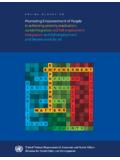
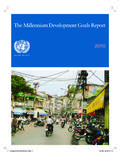
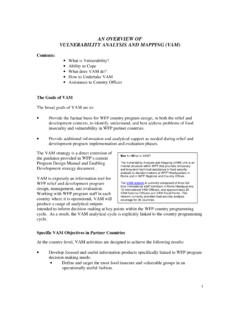
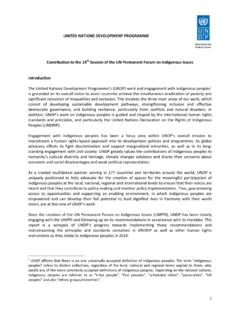
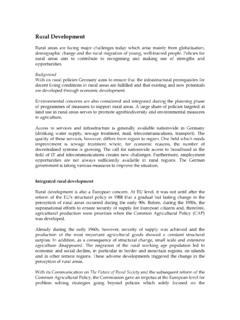
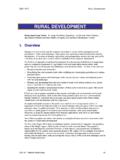
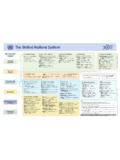
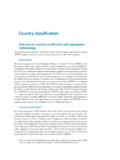
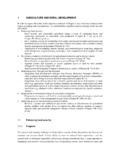
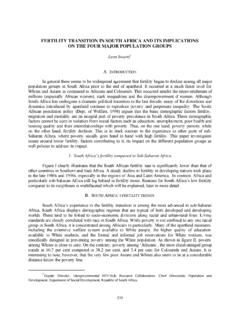
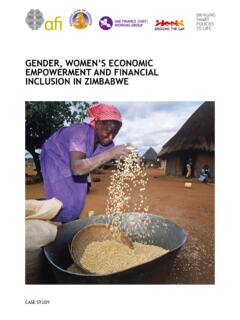
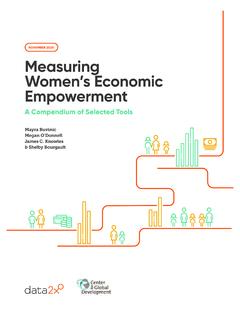
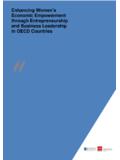
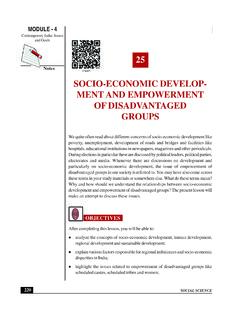
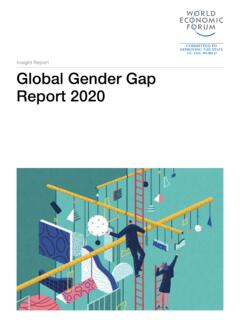
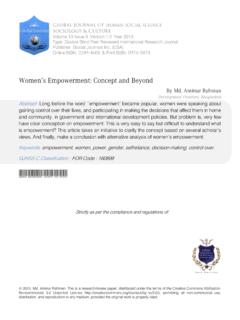
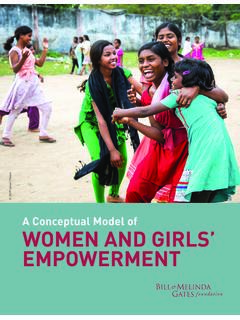
![Gender Equality and Women's Empowerment in India [OD57]](/cache/preview/0/7/f/d/9/7/1/6/thumb-07fd97166dd92c7359501888c42037d3.jpg)